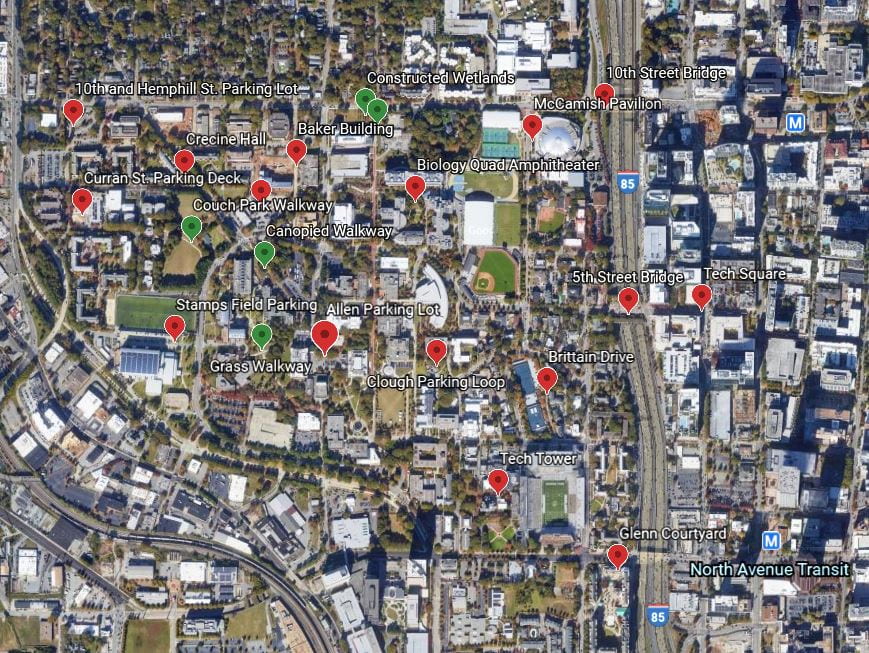A collection of urban scale data and resources, produced or curated by the Urban Climate Lab.
Heat Risk Surveillance Project
Here you can explore data sets from our Heat Risk Surveillance Project, such as average daily temperatures, minimum daily temperatures, maximum daily temperatures, and monthly averages. The data available below was collected at the Georgia Institute of Technology across 22 sensors from June 1st, 2017 to August 31st, 2017. Additional data from 2015-2019 is available upon request. For inquiries, please contact urbanclimate@design.gatech.edu.
Click here to download the Average Temperature dataset.
Click here to download the Max Temperature dataset.
High Resolution Climate Datasets for Atlanta, Phoenix, and Philadelphia
Heat-related mortality in US cities is expected to more than double by the mid-to-late 21st century. Rising heat exposure in cities is projected to result from: 1) climate forcings from changing global atmospheric composition; and 2) local land surface characteristics responsible for the urban heat island effect. The extent to which heat management strategies designed to lessen the urban heat island effect could offset future heat-related mortality remains unexplored in the literature. Using coupled global and regional climate models with a human health effects model, we estimate changes in the number of heat-related deaths in 2050 resulting from modifications to vegetative cover and surface albedo across three climatically and demographically diverse US metropolitan areas: Atlanta, Georgia, Philadelphia, Pennsylvania, and Phoenix, Arizona. Employing separate health impact functions for average warm season and heat wave conditions in 2050, we find combinations of vegetation and albedo enhancement to offset projected increases in heat-related mortality by 40 to 99% across the three metropolitan regions. Reductions in heat-related mortality across the Atlanta region are illustrated in the following figure. Access to these high resolution climate datasets is provide via the Dryad data depository, which can be accessed through the following link. More details on this study are provided in the following linked article in PLOS ONE.
Click here to view Climate Datasets on DRYAD.
Flood Factor
Flood Factor is an online tool created by the nonprofit First Street Foundation that makes it easy for Americans to find their property’s risk of flooding and understand how flood risks are changing because of a changing environment. As sea levels continue to rise, sea surface temperatures continue to increase, and the atmosphere continues to warm, floods will increase in both frequency and severity. First Street Foundation supports scientific collaboration and data transparency, and created Flood Factor to make its peer-reviewed research on these risks freely available to all.
Click here to visit Flood Factor.
Coastal Risk Screening Tool
The Coastal Risk Screening Tool depicts areas subject to inundation from sea level rise in future time periods. This tool was developed by Climate Central to map scenarios of sea-level rise, empowering users to understand where coastal adaptation or managed retreat will be required.
Click here to visit the Coastal Risk Screening Tool.
Land Emissions and Removals Navigator (LEARN) Tool
LEARN was developed to help communities in the United States estimate the local greenhouse gas (GHG) impacts of their forests and trees. The tool allows users to select a specific county, choose between layers (i.e., Land Cover, Tree Canopy, and Forest Disturbances), and calculate forest-related emissions and removals.
Click here to visit the LEARN Tool.
The Coming Heat Podcast
“Our emissions have warmed the earth to 1.2 degrees above normal temperature and we are on a steady course towards two, three and maybe four degrees. What happens when the thermostat is turned up? How much can the human body handle? Why can air conditioning be a death trap? And when will human civilization begin to collapse?”
Here you can read a full english transcript of The Coming Heat, a podcast episode recorded and produced by the Swedish radio station P3 Dystopia.

